Soviet oil. Two hundred meters to the victory of Germany
I must start this article with some apologies. When I described the seizure of the Maikop oil by the Germans, I took into account the context of the German oil plans, reflected in some archival documents. This context was known to me, but was not known to the readers, which gave rise to some misunderstanding of why the Germans were not particularly in a hurry to restore the Maikop oil fields. This context was that the Germans could not take the captured oil to Germany, and came to this conclusion even before the start of the war with the USSR.
An unusual circumstance that forces us to make significant adjustments to the understanding of the causes and background of various twists of the war, in particular, to the understanding of why the Germans tried so hard to seize Stalingrad, and in general why they needed it.
The oil problem has been the focus of the Nazi leadership since the earliest days of the Nazi regime, due to the fact that Germany was largely dependent on imported oil and oil products. The management tried to solve this problem (partly solved it successfully) by developing the production of synthetic fuel from coal. But at the same time, they looked at other sources of oil that could be in their sphere of influence, and calculated whether they could cover oil consumption in Germany and other European countries. Two notes were devoted to this issue. The first was compiled for the Research Center for War Economy by Professor of the University of Cologne, Dr. Paul Berkenkopf, in November 1939: "The USSR as an oil supplier to Germany" (Die Sowjetunion als deutscher Erdölliferant. RGVA, f. 1458, op. 40, d. 116). The second note was drawn up at the Institute of World Economy of the University of Kiel in February 1940: "The supply of Greater Germany and continental Europe with petroleum products in the current military complication of the situation" (Die Versorgung Großdeutschlands und Kontinentaleuropas mit Mineralölerzeugnissen während der gegenwärtigen kriegerischen Verwicklung. op. 500, d. 12463).
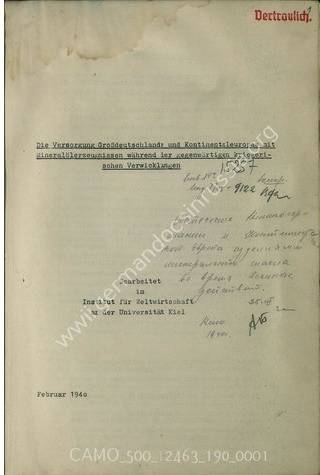
Just an explanation about Greater Germany. This is a political-geographical term with a clear meaning, meaning Germany after all territorial acquisitions since 1937, that is, together with the Sudetenland, Austria and a number of territories of former Poland annexed to the Reich.
These notes reflect German views of a certain stage of the war, when Romania, with its oil reserves, was still a country that was unfriendly to Germany, and its oil was still under the control of French and British firms, who did not want to sell oil to the Germans. The USSR at that time was still a country friendly to Germany. Therefore, it is clearly noticeable that the authors of both documents talk about the possibility of using Soviet oil exports without attempting to redistribute the consumption of oil and oil products in the USSR in favor of Germany.
How much oil do you need? You can't get so much!
Oil consumption during wartime in Germany was estimated at 6-10 million tons per year, with reserves for 15-18 months.
Available resources were estimated as follows.
Oil production in Germany - 0,6 million tons.
Synthetic gasoline - 1,3 million tons.
Expansion of synthetic gasoline production in the near future - 0,7 million tons,
Import from Galicia - 0,5 million tons.
Import from Romania - 2 million tons.
Total - 5,1 million tons (TsAMO RF, f. 500, op. 12463, d. 190, l. 3).
However, there were other estimates of military fuel consumption, which ranged from 12 to 15-17 million tons, but the authors of the Institute for World Economy in Kiel decided to proceed from consumption of 8-10 million tons per year. From this point of view, the situation did not look so stable. The production of synthetic fuel could be brought, according to their estimates, to 2,5-3 million tons, and the import accounted for 5 to 7 million tons of oil. Even in times of peace, Germany needed a lot of imports. In 1937 consumption amounted to 5,1 million tons (and in 1938 increased to 6,2 million tons, that is, by more than a million tons), domestic production - 2,1 million tons, import 3,8 million tons. tons; thus, Germany supplied itself by 41,3% (TsAMO RF, f. 500, op. 12463, d. 190, l. 7). Together with Austria and the Sudetenland, consumption in 1937 (calculated figures were used) reached 6 million tons, domestic production - 2,2 million tons, and the coverage of needs with its resources was only 36%.
Polish trophies gave the Germans another 507 thousand tons of oil and 586 million cubic meters of gas, of which 289 million cubic meters were spent on obtaining gasoline - 43 thousand tons (TsAMO RF, f. 500, op. 12463, d. 190, l. 12) ... A little, and this did not bring a serious improvement in the situation.
Oil imports to Germany before the war were in the hands of potential adversaries. Out of 5,1 million tons of imports in 1938, the United States accounted for 1,2 million tons of oil and petroleum products, the Netherlands America (Aruba) and Venezuela - 1,7 million tons. Romania exported 912 thousand tons of oil and oil products to Germany, the USSR - 79 thousand tons. In general, one disorder. The Institute for World Economy in Kiel has calculated that in the event of a blockade, Germany can only count on 20-30% of the pre-war imports.
German experts were interested in how much oil is consumed by the neutral countries of continental Europe, which, in the event of a blockade of sea transport, will turn either to Germany or to the same sources of oil as Germany. The conclusion of the calculations was not particularly comforting. The neutrals together consumed 9,6 million tons of oil and oil products in 1938, and the import into them amounted to 9,1 million tons, that is, almost the entire volume (TsAMO RF, f. 500, op. 12463, d. 190, l . 17-18). 14,2 million tons of the needs of the whole of Europe, Germany and neutral countries, which are satisfied by imports, of which 2,8 million tons are from Romania and the USSR, and the rest is from the hostile overseas.
The Soviet Union attracted Germany with its large oil production, which in 1938 amounted to 29,3 million tons, and huge oil reserves - 3,8 billion tons in reserves confirmed at the beginning of 1937. Therefore, in principle, the Germans could count on the fact that they would be able to improve their oil balance, as well as the oil balance of the neutral countries of continental Europe, at the expense of Soviet oil.
But, to the great chagrin of the Germans, the USSR consumed almost all of its oil production itself. They did not know the exact figures, but they could deduct the volume of export from the production, and they found that in 1938 the USSR produced 29,3 million tons, consumed 27,9 million tons and exported 1,4 million tons. At the same time, the consumption of the civilian sector was estimated by the Germans at 22,1 million tons of oil products, the military - 0,4 million tons, and therefore in Kiel they were confident that the USSR was accumulating annual reserves of 3-4 million tons of oil or oil products. (TsAMO RF, f. 500, op. 12463, d. 190, l. 21-22).
The USSR and Romania exported oil to different countries. If, in the event of a naval blockade of continental Europe, the entire volume of export Romanian and Soviet oil will go to Germany and to neutral countries, then in this case the deficit will be 9,2 million tons - according to estimates of pre-war consumption (TsAMO RF, fund 500, op. 12463, d.190, l.30).
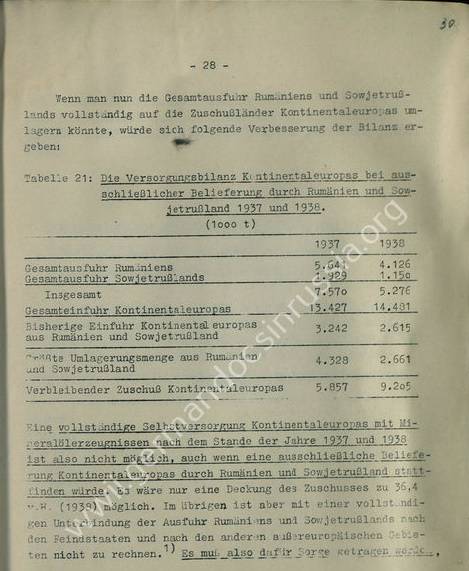
From this it was concluded: “Eine vollständige Selbstversorgung Kontinentaleuropas mit Mineralölerzeugnissen nach dem Stande der Jahre 1937 und 1938 ist also nicht möglich, auch wenn eine ausschließliche Belieferung Kontürgetaleuropas durch Rumändendendenrußen That is, even if all the export oil from Romania and the USSR will be sent to continental Europe, it will still not be enough. Whatever one may say, but 5-10 million tons of oil must be obtained from somewhere else, not from Europe. Let the Italians think about where to get oil, since Romanian and Soviet oil must be exported to Germany.
Transportation difficulties
In addition to the fact that there was clearly not enough oil at all, it was also difficult to deliver it to Germany and to most of the neutral countries of continental Europe. Soviet oil exports went through the Black Sea, especially through Batumi and Tuapse. But the fact is that Germany had no direct access to either the Black Sea or the Mediterranean. The tankers were supposed to sail around Europe, through Gibraltar controlled by Great Britain, across the English Channel, the North Sea and on to German ports. This path was already actually blocked at the time of drawing up the note at the Institute for World Economy in Kiel.
Romanian and Soviet oil could be transported by sea to Trieste, then controlled by the Italians, and loaded onto the railroad there. In this case, part of the oil would inevitably go to Italy.
Therefore, the Germans offered another option, which now seems fantastic. The USSR was supposed to export Caucasian oil by its ships along the Volga, through the channels of the Mariinsky water system to Leningrad and there to load it into sea tankers (TsAMO RF, f. 500, op. 12463, d. 190, l. 38). The Volga was the largest waterway through which oil was transported, and according to the second five-year plan, as the Germans knew, the canals of the Mariinsky system had to be reconstructed and their capacity was to increase from 3 to 25 million tons per year. This would be the best option for them. In any case, researchers at the Institute for World Economy in Kiel advocated precisely for him.
Other options for transporting Soviet oil to Germany were also considered. The Danube option was also very profitable, but required an increase in the Danube tanker fleet... The Institute of World Economy believed that it was necessary to build an oil pipeline in South-Eastern Europe in order to facilitate the transportation of oil along the Danube (TsAMO RF, f. 500, op. 12463, d. 190, l. 40). Dr. Berkenkopf had a slightly different opinion. He believed that transportation along the Danube was difficult, firstly, due to the apparent lack of capacity of the Danube fleet of barges and tankers, which are involved in the transportation of Romanian oil, and, secondly, due to the fact that Soviet tankers could not enter the mouth of the Danube. The Romanian port of Sulina could only accept ships up to 4-6 thousand brt, while Soviet tankers were larger. Tankers of the "Moscow" type (3 units) - 8,9 thousand grt, tankers of the "Emba" type (6 units) - 7,9 thousand grt. The Sovtanker fleet included 14 more tankers of various types and capacities, but the newest ships were actually excluded from oil transportation along the Danube route (RGVA, f. 1458, op. 40, d. 116, l. 18). In some perspective, the Danube was very profitable, and in May 1942, at a meeting between Hitler and Reich Minister of Armaments Albert Speer, the issue of building large harbors in Linz, Krems, Regensburg, Passau and Vienna, that is, in the upper reaches of the Danube (Deutschlands Rüstung im Zweiten Weltkrieg. Hitlers Konferenzen mit Albert Speer 1942-1945. Frankfurt am Main, "Akademische Verlagsgesellschaft Athenaion", 1969, S. 107). But in order to launch the Danube route to the capacity required for Germany and even more so for the entire continental Europe, it took several years for the construction of a tanker fleet and ports.
Railroad transportation of oil in the USSR was commonplace. Of the 39,3 billion tonne-kilometers of oil transportation in 1937, 30,4 billion tonne-kilometers fell on railway transport, of which 10,4 billion tonne-kilometers were routes over 2000 km long (RGVA, f. 1458, op. 40, d. 116, l. 12). Petroleum products, produced mainly in the Caucasus, were transported throughout the country. But the Germans, in particular, Berkenkopf, looked at this with horror, as an irrational consumption of resources and overloading of railway transport. River and sea transport from their point of view was more profitable.
Oil was transported to Germany by rail from the port of Odessa and further along the route: Odessa - Zhmerynka - Lemberg (Lvov) - Krakow - and further to Upper Silesia. In oil supplies from the USSR to Germany, which were in 1940-1941 (606,6 thousand tons in 1940 and 267,5 thousand tons in 1941), oil was transported by this very road. At the Przemysl border station, oil was pumped from tanks on the Soviet track to tanks on the European track. This was inconvenient, and therefore the Germans would like the USSR to allow the construction of a highway on the European 1435 mm gauge directly to Odessa (TsAMO RF, f. 500, op. 12463, d. 190, l. 40).
Why is that? Because, as Dr. Berkenkopf wrote, the Soviet railways were overloaded and could not handle a large volume of export cargo, and this line, Odessa - Lvov - Przemysl, was relatively little loaded. Berkenkopf estimated its throughput capacity at 1-2 million tons of oil per year; for the transportation of 1 million tons, 5 thousand tanks of 10 tons each were required (RGVA, f. 1458, op. 40, d. 116, l. 17).
Since the USSR did not alter the main line to Odessa on the European track, but on the contrary, managed to alter part of the railways in Western Ukraine to the Soviet track before the war began, the Germans had to be satisfied with what they had: severely limited supply opportunities through Odessa and by rail. Berkenkopf expressed the idea that it would be nice if an oil pipeline was built in the USSR to the border station, but this also did not happen.
200 meters to the victory of Germany
This is what German specialists wrote about the situation with oil. Now is the time for extravagant conclusions.
The first and most striking conclusion: the Germans, with all their desire, could not rob Soviet oil, simply due to the lack of opportunities to export it to Germany and other European countries. The pre-war oil transportation infrastructure did not allow Germany to export more than a million tons per year, practically even less.
Even if the Germans won a complete victory and captured the entire oil industry in perfect working order or with minor damage, it would take them 5-6 years to build a fleet or oil pipelines for the Caucasian oil to actually go to Germany and the rest of Europe.
In addition, of the 21 Sovtanker tankers in 1941, the German aviation and the fleet sunk 3 tankers and in 1942 - 7 tankers. That is, the Germans themselves have reduced the Soviet tanker fleet in the Black Sea by almost half. They got only one tanker, Grozneft, a former cruiser rebuilt into a tanker (it turned out to be armored, since the cruiser's armor was not removed), which in 1934 was converted into a barge, and since 1938 was laid up in Mariupol and was sunk there in October 1941 during the retreat. The Germans raised him. Formally a tanker, but unsuitable for sea transportation.
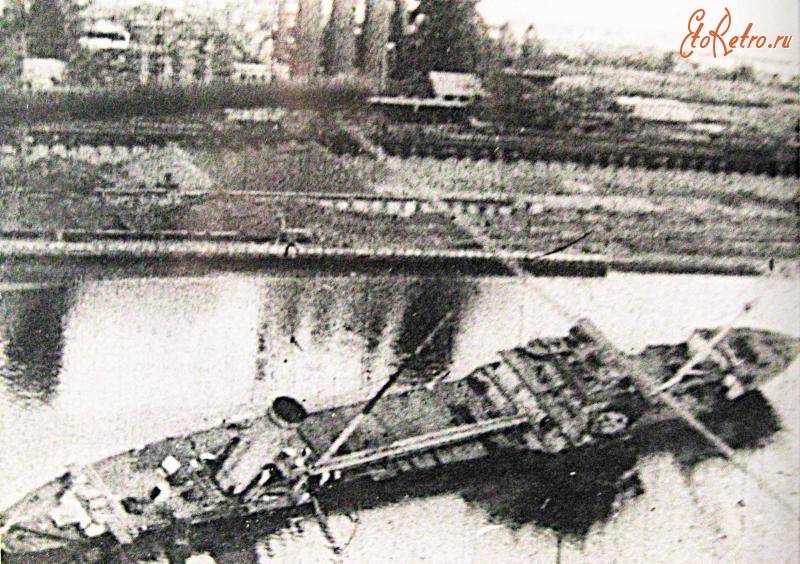
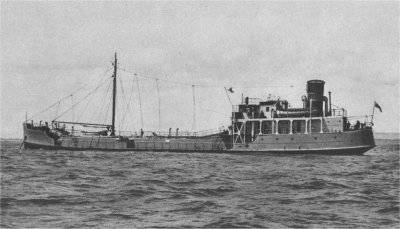
So, the Germans did not get the Soviet tanker fleet in the trophies, they did not have their own on the Black Sea, the Romanian tanker fleet, Danube and sea, was busy with current shipments. Therefore, the Germans, having seized Maykop, were not particularly in a hurry to restore the oil fields, in view of the fact that there were no opportunities for the export of oil in Germany and were not foreseen in the near future. They could use the captured oil only for the current needs of troops and aviation.
The second conclusion: we clearly perceive Hitler's well-known thesis that it is necessary to seize the Caucasian oil. We are used to thinking that we are talking about exploitation. But Hitler undoubtedly read either these notes or other materials based on them, and therefore knew well that the supply of Caucasian oil to Germany was a matter of some distant future, and it would be impossible to do this immediately after the seizure. So the meaning of Hitler's demand to seize the Caucasian oil was different: that the Soviets did not get it. That is, to deprive the Red Army of fuel and thereby deprive it of the opportunity to conduct hostilities. Purely strategic sense.
The offensive on Stalingrad solved this problem much better than the offensive on Grozny and Baku. The fact is that not only mining, but also processing before the war were concentrated in the Caucasus. Large refineries: Baku, Grozny, Batumi, Tuapse and Krasnodar. A total of 32,7 million tons of capacity. Cutting communications to them would be tantamount to seizing the oil-producing regions themselves. Water communications are the Volga, and railways are highways to the west of the Don. Before the war, the Lower Volga had no railway bridges, the lowest of them was only in Saratov (commissioned in 1935). Railway communication with the Caucasus was carried out mainly through Rostov.
Therefore, the capture of Stalingrad by the Germans would mean an almost complete loss of Caucasian oil, even if it was still in the hands of the Red Army. It would have been impossible to take it out, with the exception of a relatively small export from Baku by sea to Krasnovodsk and further along the railway in a roundabout way through Central Asia. How serious would that be? We can say that it is serious. In addition to the blocked Caucasian oil, Bashkiria, Emba, Fergana and Turkmenistan would remain with a total production in 1938 of 2,6 million tons of oil, or 8,6% of the pre-war allied production. This is about 700 thousand tons of gasoline per year, or 58 thousand tons per month, which, of course, is pitiful crumbs. In 1942, the average monthly consumption of fuel and lubricants in the army was 221,8 thousand tons, of which 75% was gasoline of all grades, that is, 166,3 thousand tons of gasoline. Thus, the needs of the army would be 2,8 times more than the remaining oil refining could supply. This is a situation of defeat and collapse of the army due to lack of fuel.
How long did the Germans not reach the Volga in Stalingrad? 150-200 meters? These meters separated them from victory.
Well, is your hair moving? Genuinely documentary story much more interesting and dramatic than the one described in colorful myths.
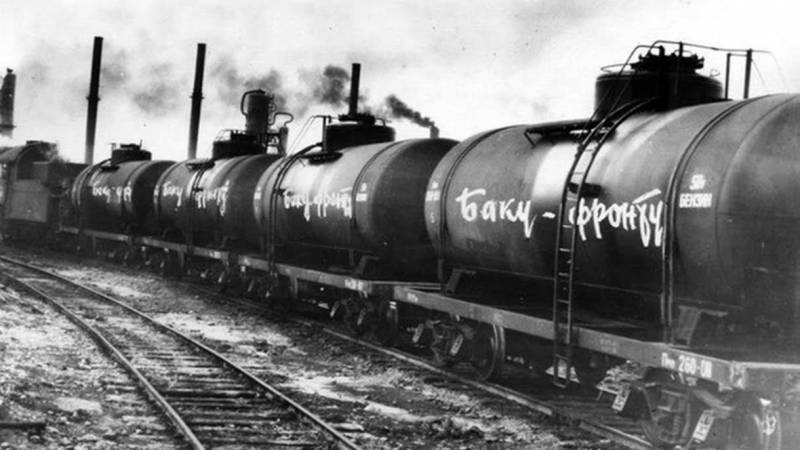
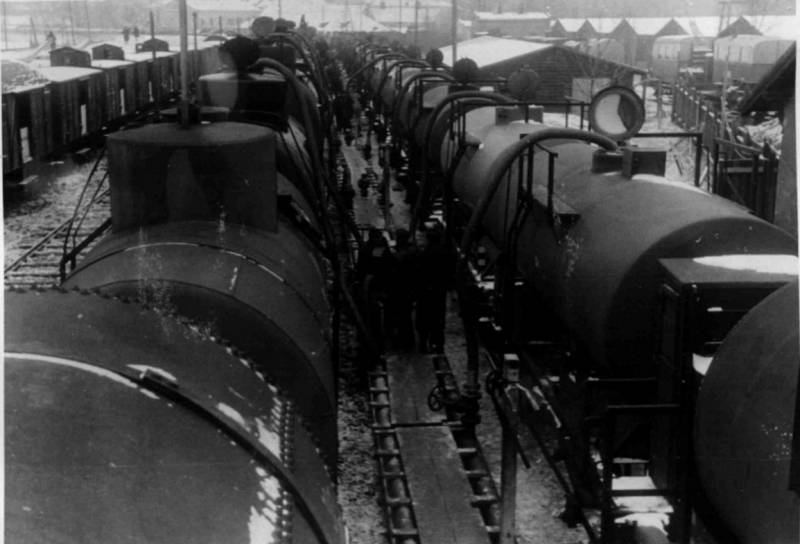
Information